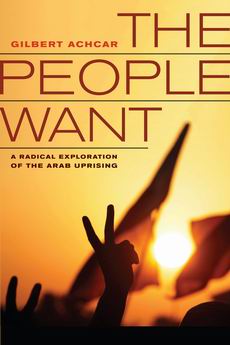
The People Want
A Radical Exploration of the Arab Uprising
Achar, Gilbert
Date Written: 2013-09-03
Publisher: University of California Press
Year Published: 2013
Pages: 328pp ISBN: 978-0520280519
Resource Type: Book
Cx Number: CX18421
"The people want . . .": This first half of slogans chanted by millions of Arab protesters since 2011 revealed a long-repressed craving for democracy. But huge social and economic problems were also laid bare by the protestors' demands.
Abstract:
"The people want . . .": This first half of slogans chanted by millions of Arab protesters since 2011 revealed a long-repressed craving for democracy. But huge social and economic problems were also laid bare by the protestors' demands.
Simplistic interpretations of the uprising that has been shaking the Arab world since a young street vendor set himself on fire in Central Tunisia, on 17 December 2010, seek to portray it as purely political, or explain it by culture, age, religion, if not conspiracy theories. Instead, Gilbert Achcar locates the deep roots of the upheaval in the specific economic features that hamper the region’s development and lead to dramatic social consequences, including massive youth unemployment. Intertwined with despotism, nepotism, and corruption, these features, produced an explosive situation that was aggravated by post-9/11 U.S. policies. The sponsoring of the Muslim Brotherhood by the Emirate of Qatar and its influential satellite channel, Al Jazeera, contributed to shaping the prelude to the uprising. But the explosion’s deep roots, asserts Achcar, mean that what happened until now is but the beginning of a revolutionary process likely to extend for many more years to come.
The author identifies the actors and dynamics of the revolutionary process: the role of various social and political movements, the emergence of young actors making intensive use of new information and communication technologies, and the nature of power elites and existing state apparatuses that determine different conditions for regime overthrow in each case. Drawing a balance-sheet of the uprising in the countries that have been most affected by it until now, i.e. Tunisia, Egypt, Yemen, Bahrain, Libya and Syria, Achcar sheds special light on the nature and role of the movements that use Islam as a political banner. He scrutinizes attempts at co-opting the uprising by these movements and by the oil monarchies that sponsor them, as well as by the protector of these same monarchies: the U.S. government. Underlining the limitations of the “Islamic Tsunami” that some have used as a pretext to denigrate the whole uprising, Gilbert Achcar points to the requirements for a lasting solution to the social crisis and the contours of a progressive political alternative.
-
Table of Contents
Figures and Tables
Acknowledgments
Preliminary Notes
On the Arab Countries and “the Middle East and North Africa” (MENA)
On Transliteration of Arabic
Introduction: Uprisings and Revolutions
1. Fettered Development
The Facts
Poverty, Inequality, Precarity
Informal Sector and Unemployment: The Bouazizi Syndrome
Youth Underemployment
Female Underemployment
Graduate Unemployment
Fetters on Development
2. The Peculiar Modalities of Capitalism in the Arab Region
The Problem of Investment
Public and Private Investment
A Specific Variant of the Capitalist Mode of Production
1. Rentier and Patrimonial States
2. A Politically Determined Capitalism: Nepotism and Risk
The Genesis of the Specific Regional Variant of Capitalism: An Overview
3. Regional Political Factors
The Oil Curse
From “Arab Despotic Exception” to “Democracy Promotion”
The Muslim Brothers, Washington, and the Saudis
The Muslim Brothers, Washington, and Qatar
Al Jazeera and the Upheaval in the Arab Mediascape
4. Actors and Parameters of the Revolution
Overdetermination and Subjective Conditions
The Workers’ Movement and Social Struggles
New Actors and New Information and Communications Technologies
States and Revolutions
5. A Provisional Balance Sheet of the Arab Uprising
Coups d’État and Revolutions
Provisional Balance Sheet No. 1: Tunisia
Provisional Balance Sheet No. 2: Egypt
Provisional Balance Sheet No. 3: Yemen
Provisional Balance Sheet No. 4: Bahrain
Provisional Balance Sheet No. 5: Libya
Provisional Balance Sheet No. 6: Syria
6. Co-opting the Uprising
Washington and the Muslim Brothers, Take Two
Nato, Libya, and Syria
The “Islamic Tsunami” and the Difference between Khomeini and Morsi
Conclusion: The Future of the Arab Uprising
The Difference between Erdogan and Ghannouchi . . .
. . . And the Difference between Erdogan and Morsi
Conditions for a Genuine Solution
Notes
References and Sources
Index


